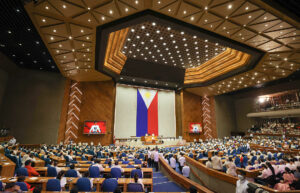THE PHILIPPINE legislature, with majority of both chambers allied with the Marcos administration, should exercise its authority as an independent body in keeping watch over the foreign policy decisions of the executive branch, analysts said at the weekend.
“The legislature is expected to play an important role in deliberating (assessing and evaluating) the viability and long-term repercussions of an emerging foreign policy or bilateral/multilateral agreement,” Arjan P. Aguirre, a political science professor at the Ateneo De Manila University, said via Messenger chat.
Under Philippine law, international treaties and agreements require a majority vote of the Senate for concurrence before ratification.
Jaime P. Naval, who teaches political science at the University of the Philippines, said in a Zoom interview that “Congress would have to act like a watchdog at the very least.”
Mr. Naval noted that while the executive branch, led by the president, is the “chief architect” that initiates and implements foreign policies, “The role of the legislature… is to scrutinize if ever there might be (an) errancy or inconsistency.”
Under the current set of elected executive and legislative leaders, however, the two branches are “politically fused or aligned together due to the ability of the executive to have full and effective control of the government resources (e.g. discretionary funds, appointments, etc.),” Mr. Aguirre said.
He added that a supermajority in Congress “undermines the principle of institutional independence between and among our branches of government,” and would lead to “hasty yet inadequate passage of laws or ratification of treaties that usually harm the interest of the general public.”
Last week, the Philippine government gave the United States access to four more military bases, bringing the total to nine, under the 2014 Enhanced Defense Cooperation Agreement (EDCA). — Beatriz Marie D. Cruz
